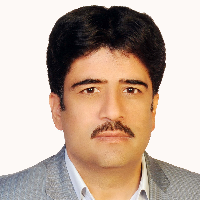The Analysis of Adaptability of Astan Quds Razavi Libraries in Mashhad with respect to Centrality and Compatibility
Author(s):
Article Type:
Research/Original Article (دارای رتبه معتبر)
Abstract:
Introduction
The appropriate allocation of space and optimal location of the urban services and physical elements, especially the cultural centers along with paying enough attention to effective factors in locating these centers have a significant role in improving the quality and quantity of services in such centers. Therefore, in distributing public facilities, libraries should be considered in terms of resident's access to the best location. They should be economically and socially justifiable. Therefore, the creation and expansion of libraries- basically, the creation of suitable facilities for studying- is considered as the necessary factor for the perfect life of the knowledgeable people.Theoretical Framework: From the sub-criteria of urban development, one may refer to the appropriate location of public services, especially the establishment of library centers, which has a positive role in providing citizens with public services. Therefore, locating appropriate libraries and accessing them represents a chain of educational, guidance, and awareness-raising systems that can improve the general level of citizen's awareness. Among the main goals of libraries, we can refer to the internal and external aspects that can show how people use the facilities. This is associated with rich resources, good employee behavior, having diverse sections, and the high level of services. Among the external aspects affecting the rate of referring and using the library, one can refer to the way in which libraries are geographically located and distributed at the urban level. Thus, the location of libraries and how they are distributed directly or indirectly affect how people use and refer to the libraries (Mokhtarpour, 2009).
Methodology
The current applied research has a descriptive-analytic approach. The library and field method (observation & questionnaire) were used to collect the required data. Hence, in the first step, the criteria affecting on locating of libraries, including 50 main criteria and sub-criteria were determined. Subsequently, based on the identified criteria, a questionnaire was designed to weighting these criteria. The questionnaire was designed using Hierarchical Analysis (AHP) and the views of experts. In the next step, by using Geographic Information System - GIS software) version 10.3(and spatial functions, and by applying the weight to the layers and combining the layers, the situation was investigated and the zones were determined.Results
In recent years, access to the public services has become a very common concept and has attracted the attention of planners and scholars. Therefore, access to the public services and the provision of their needs are a multidimensional influential concept in the social sciences and in many other disciplines. Thus, it has attained a special attention in the relevant literature and some believe that it is a missing piece in the citizen's livelihood requirements. In Iran, due to the urbanization and its related issues, access to the public services, including library centers in urban neighborhoods has led to the development of awareness and intellectual development in the urban areas over the recent decades. The study area of this research is located in Mashhad, a city in the east of Iran, with a history of more than a hundred years. It has undergone many changes in terms of urban and cultural development. Like all other cities of the country, in the last three decades, with the commencement of land provision in Iran, there has been a significant increase in taking the public services such as the growth of culture and education into account. Therefore, on the one hand promoting public services and raising awareness have been addressed in these urban neighborhoods and on the other hand, having access to the library services has attracted the urban managers and planners. Thus, it has led to improvements in locating libraries in the urban centers. As a result, the adaptability of Astan Quds Razavi libraries to the centrality and compatibility is considered in the current study.Conclusion
The findings of the research showed that a number of the libraries located in the areas are completely incompatible. Therefore, in determining the degree of adaptability of the libraries to the centrality, it was found that 24% of the libraries are in perfect locations, 33% are in the proper locations, 22% are in a relatively good location, and 17% are in the wrong locations. In general, 24% of all affiliate libraries were in a perfect location. Also, the findings show that in order to achieve proper productivity, prior to any planning for the establishment of a library, adequate studies should be done on the correct location from the point of view of centrality and compatibility. Therefore, according to the results of field studies and the research on the establishment of Astan Quds libraries, much work is needed to improve the quality and quantity of services in these areas compared to more compatible and appropriate areas. This should be among the very concerns of the official managers and organizations.Keywords:
Language:
Persian
Published:
Journal of Geography and Urban Space Development, Volume:4 Issue: 2, 2018
Pages:
43 to 61
magiran.com/p1854842
دانلود و مطالعه متن این مقاله با یکی از روشهای زیر امکان پذیر است:
اشتراک شخصی
با عضویت و پرداخت آنلاین حق اشتراک یکساله به مبلغ 1,390,000ريال میتوانید 70 عنوان مطلب دانلود کنید!
اشتراک سازمانی
به کتابخانه دانشگاه یا محل کار خود پیشنهاد کنید تا اشتراک سازمانی این پایگاه را برای دسترسی نامحدود همه کاربران به متن مطالب تهیه نمایند!
توجه!
- حق عضویت دریافتی صرف حمایت از نشریات عضو و نگهداری، تکمیل و توسعه مگیران میشود.
- پرداخت حق اشتراک و دانلود مقالات اجازه بازنشر آن در سایر رسانههای چاپی و دیجیتال را به کاربر نمیدهد.
In order to view content subscription is required
Personal subscription
Subscribe magiran.com for 70 € euros via PayPal and download 70 articles during a year.
Organization subscription
Please contact us to subscribe your university or library for unlimited access!



